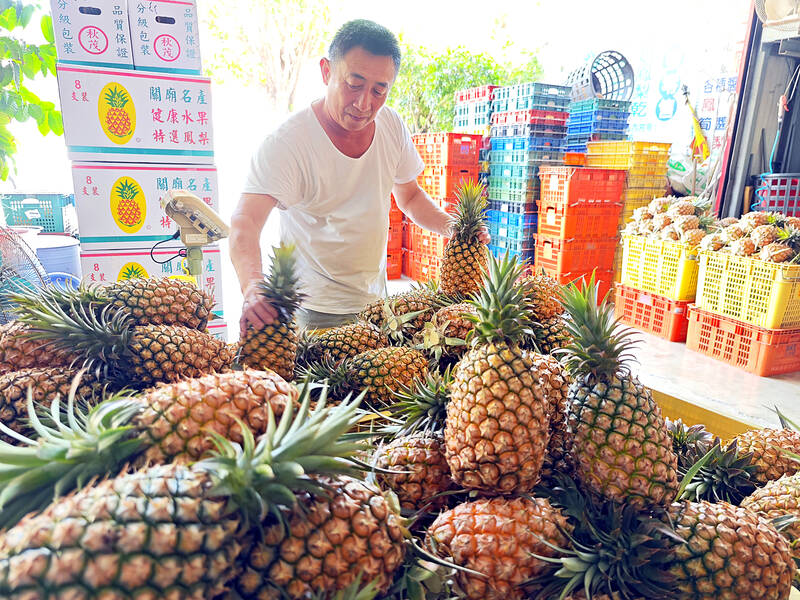The Ministry of Agriculture’s Agriculture and Food Agency yesterday said that it plans to expand the number of greenhouses and screen houses dedicated to fruit cultivation nationwide, to support farmers affected by extreme weather conditions.
The nation’s fruit prices have surged more sharply than usual this year, due to typhoons last year and cold fronts earlier this year, the agency said.
Past efforts to promote greenhouse and screen house cultivation for fruit production have had limited success due to high costs — often exceeding NT$1.2 million (US$39,969) per fen (969.91m2) of land — low incentives for farmers to grow climate-resilient fruits and the long maturation period required before fruit trees yield economic returns, it said.

Photo: Wu Chun-feng, Taipei Times
To better support fruit farmers, the agency is increasing subsidy amounts and lifting restrictions on the types of fruits eligible for support, Deputy Director-General of the Agriculture and Food Agency Chen Chi-jung (陳啟榮) said.
Subsidies would be raised by 50 percent for farms in western Taiwan, 60 percent in eastern Taiwan and 65 percent for farms on indigenous lands or outlying islands, he said, adding that the agency is offering low-interest agricultural loans to ease farmers’ financial burdens.
Citing data from the Taipei Fruit and Vegetable Wholesale Market, the agency said that prices for pineapples, guavas and bananas have risen 30 percent compared with the same period last year, amid a decline in supply.
Chen said that most fruits have one or two harvests per year, but the inclement weather over the past year has disrupted this cycle, resulting in decreased pollination for mangoes and only 30 to 40 percent of the normal yield.
Pears and pineapples have also experienced a 10 percent drop in yield, while the market entry of lemons is expected to be delayed this year, he said.
The decrease in supply would possibly affect prices, he said.
To mitigate the impact, the ministry is redirecting portions of the fruit harvest for processing into products such as wine and other value-added goods, Chen said.
It is also expanding cold-chain logistics to preserve fruit quality and reduce post-harvest losses, Chen said, adding that the agency is promoting fruit exports via contract farming.

Chinese Nationalist Party (KMT) lawmakers have declared they survived recall votes to remove them from office today, although official results are still pending as the vote counting continues. Although final tallies from the Central Election Commission (CEC) are still pending, preliminary results indicate that the recall campaigns against all seven KMT lawmakers have fallen short. As of 6:10 pm, Taichung Legislators Yen Kuan-heng (顏寬恒) and Yang Chiung-ying (楊瓊瓔), Hsinchu County Legislator Lin Szu-ming (林思銘), Nantou County Legislator Ma Wen-chun (馬文君) and New Taipei City Legislator Lo Ming-tsai (羅明才) had all announced they

CHAMPIONS: President Lai congratulated the players’ outstanding performance, cheering them for marking a new milestone in the nation’s baseball history Taiwan on Sunday won their first Little League Baseball World Series (LLBWS) title in 29 years, as Taipei’s Dong Yuan Elementary School defeated a team from Las Vegas 7-0 in the championship game in South Williamsport, Pennsylvania. It was Taiwan’s first championship in the annual tournament since 1996, ending a nearly three-decade drought. “It has been a very long time ... and we finally made it,” Taiwan manager Lai Min-nan (賴敏男) said after the game. Lai said he last managed a Dong Yuan team in at the South Williamsport in 2015, when they were eliminated after four games. “There is

Nvidia Corp CEO Jensen Huang (黃仁勳) yesterday visited Taiwan Semiconductor Manufacturing Co (TSMC, 台積電), as the chipmaker prepares for volume production of Nvidia’s next-generation artificial intelligence (AI) chips. It was Huang’s third trip to Taiwan this year, indicating that Nvidia’s supply chain is deeply connected to Taiwan. Its partners also include packager Siliconware Precision Industries Co (矽品精密) and server makers Hon Hai Precision Industry Co (鴻海精密) and Quanta Computer Inc (廣達). “My main purpose is to visit TSMC,” Huang said yesterday. “As you know, we have next-generation architecture called Rubin. Rubin is very advanced. We have now taped out six brand new

POWER PLANT POLL: The TPP said the number of ‘yes’ votes showed that the energy policy should be corrected, and the KMT said the result was a win for the people’s voice The government does not rule out advanced nuclear energy generation if it meets the government’s three prerequisites, President William Lai (賴清德) said last night after the number of votes in favor of restarting a nuclear power plant outnumbered the “no” votes in a referendum yesterday. The referendum failed to pass, despite getting more “yes” votes, as the Referendum Act (公民投票法) states that the vote would only pass if the votes in favor account for more than one-fourth of the total number of eligible voters and outnumber the opposing votes. Yesterday’s referendum question was: “Do you agree that the Ma-anshan Nuclear Power Plant